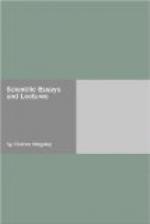be able to afford; while as for books—books
on these subjects are now published at a marvellous
cheapness, which puts them within the reach of every
one, and of an excellence which twenty years ago was
impossible. Any working man in this town might
now, especially in a class, consult scientific books,
for which I, as a lad, twenty years ago, was sighing
in vain; nay, many of which, twenty years ago, the
richest nobleman could not have purchased; for the
simple reason, that, dear or cheap, they did not exist.
Such classes, too, would be the easiest, cheapest,
and pleasantest way of establishing what ought to
exist, I think, in connection with every institution
like this, namely, a museum. If the young men
were really ready and willing to collect objects of
interest, I doubt not that public-spirited men would
be found, who would undertake the expense of mounting
them in a museum. And you cannot imagine, I
assure you, how large and how interesting a museum
might be formed of the natural curiosities of a neighbourhood
like this, I may say, indeed, of any neighbourhood
or of any parish: but your museum need not be
confined to the neighbourhood. Societies now
exist in every part of England, who will be happy to
exchange their duplicates for yours. As your
collection increased in importance, old members abroad
would gladly contribute foreign curiosities to your
stock. Neighbouring gentlemen would send you
valuable objects which had been lumbering their houses,
uncared for, because they stood alone, and formed
no part of a collection; and I, for one, would be
happy to add something from the fauna and flora of
those moorlands, where I have so long enjoyed the wonders
of nature; never, I can honestly say, alone; because
when man was not with me, I had companions in every
bee, and flower, and pebble; and never idle, because
I could not pass a swamp, or a tuft of heather, without
finding in it a fairy tale of which I could but decipher
here and there a line or two, and yet found them more
interesting than all the books, save one, which were
ever written upon earth.
THE NATURAL THEOLOGY OF THE FUTURE
Read at Sion College, January 10th, 1871.
When I accepted the unexpected and undeserved honour
of being allowed to lecture here, the first subject
which suggested itself to me was Natural Theology.
It is one which has taken up much of my thought for
some years past, {313} which seems to me more and
more important, and which is just now somewhat forgotten;
I therefore determined to say a few words on it to-night.
I do not pretend to teach but only to suggest; to
point out certain problems of Natural Theology, the
further solution of which ought, I think, to be soon
attempted.
I wish to speak, remember, not on natural religion,
but on natural theology. By the first, I understand
what can be learned from the physical universe of
man’s duty to God and to his neighbour; by the
latter, I understand what can be learned concerning
God Himself. Of natural religion I shall say
nothing. I do not even affirm that a natural
religion is possible: but I do very earnestly
believe that a natural theology is possible; and I
earnestly believe also that it is most important that
natural theology should, in every age, keep pace with
doctrinal or ecclesiastical theology.




